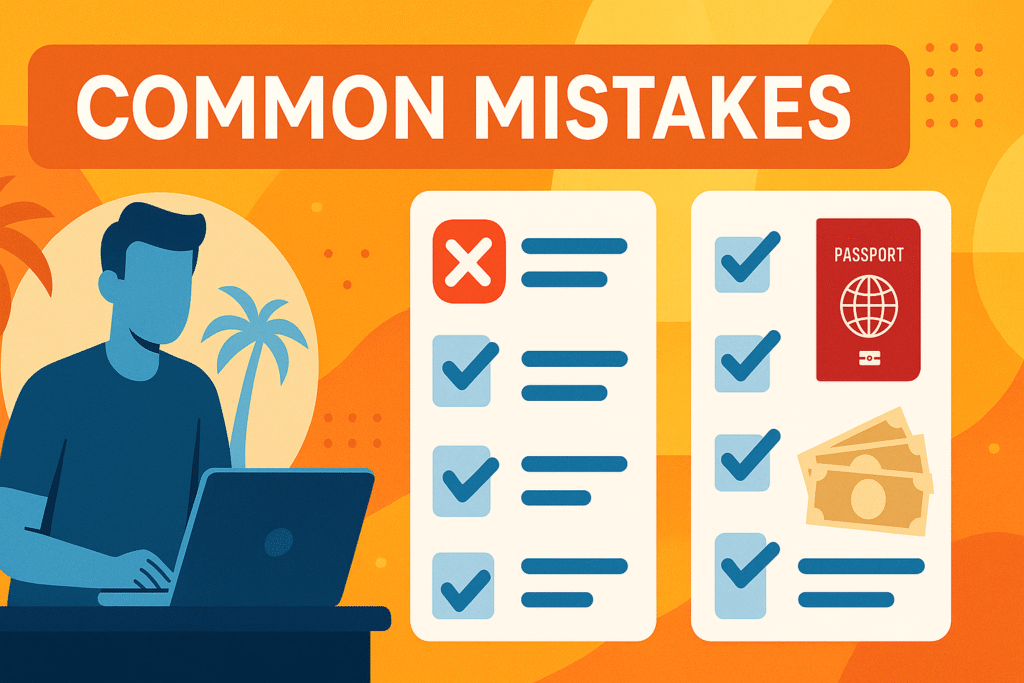The Brazilian digital nomad visa—known formally as the VITEM XIV—has opened a gateway for remote workers to live, earn and explore in Brazil. Thousands of professionals from North America and Europe have taken advantage of this immigration pathway. But the same excitement that draws travellers to Brazilian beaches and cities can lead to oversights. Failing to follow the rules or provide the right documents can delay or even derail your application.
This article examines the most often mistakes when applying for the digital nomad visa. By the end you will know what the visa requires, why some common errors occur, and how to avoid them. Throughout, we convert costs into Brazilian Real (BRL), U.S. Dollars (USD) and Euros (EUR) and describe measurements in both metric and imperial units.
Before diving into details, remember that the digital nomad visa is a formal residence permit. Under Brazilian law a digital nomad must work for a foreign employer and perform duties remotely. Applicants must present an employment or service contract, show proof of monthly income of at least US$ 1,500 (about R $8,206 / €1,291) or proof of bank funds of US$ 18,000 (about R $98,476 / €15,492). Visa holders can stay for up to one year and renew once. These requirements mean that missing or inaccurate documents can ruin an otherwise strong application. Let’s look at the top mistakes—and how to fix them.

Understanding the digital nomad visa and its documents
To appreciate why errors occur, you must first understand what the digital nomad visa demands. Brazil’s National Immigration Council defines a digital nomad as someone who uses information and communication technologies to work for a foreign company while in Brazil. The consulate in London specifies that applicants must submit a notarized letter from the employer affirming that all tasks can be performed remotely and may request additional contracts to confirm the relationship.
They must also show pay slips demonstrating a monthly income of at least US$1,500 or bank statements showing funds of US$18,000. In addition to these financial documents, applicants need a valid passport, a completed application form, proof of kinship (if applying with family), a police clearance certificate and health insurance valid for the entire stay.
Brazilian consulates emphasize that failure to provide proper documents is one of the most common mistakes digital nomad visa applicants make. Because the rules are new, applicants often overlook small but important details—like apostille stamps, translations or certified copies. The following sections explore the seven errors most frequently observed, along with practical tips for North Americans and Europeans.
Mistake 1: Assuming any remote worker qualifies for a digital nomad visa
Not every remote job fits the legal definition of a digital nomad. Brazilian authorities specify that an applicant must work exclusively for companies or clients outside Brazil A freelancer who plans to take local Brazilian clients may inadvertently violate the visa’s purpose. The digital nomad visa is not intended for people who will sell services to Brazilian companies or for those working for Brazilian employers.
Applicants must sign a declaration that all professional activities will be performed remotely for foreign clients. If you expect to find local work once in Brazil, this visa is not for you. A common mistake is to gloss over this requirement; consulates routinely ask for employer letters proving remote work. Without this letter your application may be denied.
Mistake 2: Submitting incomplete or incorrect financial documents
Financial proof is central to the digital nomad visa. Applicants must show either monthly pay slips demonstrating an income of at least US$ 1,500 or bank statements reflecting a balance of at least US$ 18,000. The consulate may also ask to see the employment or service contract to confirm that payments come from a foreign company.
A typical error is sending only one month’s pay slip or an incomplete series of bank statements. Another mistake is not converting income into BRL or EUR equivalents for clarity. At August 2025 exchange rates, US$1,500 corresponds to roughly R $8,206 or €1,291, while US$18,000 equals about R $98,476 or €15,492. Consulates often require certified translations of financial documents; not doing so can lead to delays. Always include the full three‑month bank history, convert currency values and provide official translations.
Mistake 3: Neglecting to apostille and translate documents
Under the Hague Apostille Convention, foreign public documents must be apostilled to be accepted in Brazil. This includes birth certificates, marriage certificates and police clearances. North Americans often forget to apostille their documents, mistakenly believing that notarization alone suffices. In Europe, some nations like Portugal and Spain issue apostille stamps through designated offices; others require an extra step. Without apostilles and translations into Portuguese (or sometimes English, depending on the consulate), your digital nomad visa application may be returned for corrections. Some consulates accept documents in English, but others insist on Portuguese translations by a sworn translator. Contact your local consulate early to confirm language requirements and apostille procedures.
Mistake 4: Using the wrong consulate or misunderstanding jurisdiction
Brazilian consulates have specific jurisdictions. Applicants must apply at the consulate responsible for their place of residence—not merely the most convenient location. For instance, Canadians living in Ontario must apply through the Consulate General in Toronto, while those in British Columbia must use Vancouver. Europeans face similar divisions: residents of the UK must submit to the London consulate, whereas Irish residents apply through Dublin.
Filing with the wrong consulate is a frequent mistake digital nomad visa seekers make; the application will be rejected, and they’ll have to start over. Double‑check consular jurisdictions on official websites before scheduling appointments. Also verify whether the consulate accepts mailed applications or requires in‑person visits. Some consulates allow courier submissions, while others insist on personal attendance.
Mistake 5: Overlooking health insurance and staying uninsured
Brazilian law requires digital nomads to maintain health insurance covering the entire stay. The Consulate in London emphasizes that the policy must be valid in Brazil for the length of residence. A common error is purchasing a travel policy covering only the first 90 days. Since the digital nomad visa can last up to one year, your insurance should match the duration. Without proof of extended coverage, the consulate may refuse the application. Comprehensive health insurance typically costs R $300–R $800 per month (≈US$55–US$146 / €45–€126). Ensure your insurer provides coverage for hospitalization, emergency care and repatriation. Include the full insurance policy in your documents packet and confirm that the policy mentions Brazil by name.
Mistake 6: Failing to register with the Federal Police and renew on time
Once you enter Brazil with your digital nomad visa, you must register with the Federal Police within 30 days. Many travellers assume their visa stamp is sufficient; however, registration produces the Carteira de Registro Nacional Migratório (CRNM), Brazil’s residence card. Failing to register is one of the costliest mistakes digital nomad visa holders make. Without the CRNM you cannot sign leases or receive local services. When your first year ends, you must apply for renewal before expiration.
Article 6 of the normative resolution states that the residence period may be renewed if the applicant provides updated documents proving remote work, a copy of the CRNM and new criminal record certificates. Missing renewal deadlines can force you to leave Brazil or pay fines. Set calendar reminders and plan to renew at least 30 days before your residence expires.
Mistake 7: Ignoring tax residency rules and overstaying 183 days
Although the digital nomad visa is primarily about immigration, it has tax implications. Brazil considers anyone present in the country for more than 183 days within a 12‑month period a tax resident. Upon becoming a tax resident, you must file Brazilian income tax returns and declare worldwide income. Failing to track days is a common mistake; many digital nomads inadvertently pass the 183‑day mark because they assume their visa status exempts them from tax.
The safest approach is either to limit stays to under 183 days (about six months) or to plan for tax residency. If you become a tax resident, gather documents such as pay slips and foreign tax returns, and consult a Brazilian accountant to comply with filing obligations. Remember to factor in Brazil’s progressive tax rates (7.5 % to 27.5 %) when budgeting.
Practical tips to avoid mistakes
Create a comprehensive checklist
Before submitting your application, list every item required by the consulate: passport, application form, employer letter, employment contract, income proof, bank statements, criminal record certificate, birth or marriage certificate if applying with family, health insurance and proof of residence. Cross off each item as you gather it. Keep documents organized in digital and physical folders. Many mistakes digital nomad visa applicants make stem from missing a single page or forgetting to print two copies.
Translate and apostille early
Acquiring apostilles and translations can take weeks. Start this process as soon as you decide to apply. Use sworn translators recognized by the Brazilian government. When in doubt about whether a document needs an apostille, err on the side of caution. Submit both original and certified copies. This step prevents rejections due to incomplete documents.
Verify consulate requirements
Although Brazil’s Immigration Council sets national rules, consulates have discretion in implementing them. Some may ask for additional documents, such as proof of accommodation or letters of intent. Check the website of your consulate for specific instructions and contact them if you’re uncertain. Not reading consular guidelines is a frequent mistake digital nomad visa seekers make, leading to unnecessary delays. Booking flights or accommodation before your visa is approved can be risky; wait until you receive confirmation.
Maintain accurate financial records
Bank statements should be clear, with no unexplained large deposits. If your income fluctuates, ensure that the average meets the minimum requirement. Freelancers often forget to include invoices or contracts showing their revenue streams. Keep digital copies of all financial documents in case the consulate requests additional evidence. Use currency conversion tools to show equivalent amounts in BRL and EUR, and include a note that you used the official exchange rate (e.g., 1 USD = 5.47 BRL; 1 EUR = 6.36 BRL).
Plan your travel timeline
Give yourself at least two months from the start of the application to your intended travel date. Application processing typically takes 5–20 business days, but delays are common. If you need to renew your visa after a year, start gathering updated documents three months before expiration. Use calendar reminders to track your 183‑day residency threshold. Many mistakes digital nomad visa holders make occur because they miscalculate the days or forget to renew. Travel outside Brazil to reset your residency count if you want to avoid becoming a tax resident.
Consult professionals
When in doubt, hire an immigration lawyer or visa consultant. Professionals familiar with the digital nomad visa can help interpret obscure instructions, ensure your documents are correct and answer questions about tax residency. The cost may range from R $2,500 to R $5,000 (≈US$460–US$920 / €405–€810), but this investment can save time and stress. Avoid relying solely on social media groups for advice; while communities are helpful, they can inadvertently perpetuate incorrect information.
Stay informed about changes
Immigration policies evolve. Since the digital nomad visa is relatively new, consulates may update income requirements or application procedures. For instance, some consulates could increase the income threshold if the exchange rate changes dramatically. Sign up for notifications from your nearest Brazilian consulate and regularly check official websites. Avoid the mistakes digital nomad visa applicants make when they base their decisions on outdated blog posts. Always confirm details with official sources.

Additional considerations for North Americans and Europeans
Banking and currency
Opening a Brazilian bank account is easier with the digital nomad visa and a CRNM. You may need a CPF (Brazilian taxpayer number) and proof of address. Keep in mind that currency fluctuations impact living costs. In August 2025, 1 USD equaled 5.47 BRL, and 1 EUR equaled 6.36 BRL. Monitor rates and convert funds when favourable. Some banks charge international transfer fees of R $50–R $100 (≈US$9–US$18 / €8–€16) per transaction. Using multi‑currency accounts like Wise or Revolut can minimize fees.
Climate and geography
Brazil offers diverse climates. In Rio de Janeiro, summer highs average 31 °C (88 °F) and winter lows around 19 °C (66 °F). Distances are vast: São Paulo lies about 430 km (267 miles) from Rio. Planning travel between regions requires considering local weather, flight availability and cost. Don’t forget to factor climate into your planning; a beach lifestyle may influence your choice of co‑working spaces or accommodation.
Cost of living
Monthly expenses vary by city. According to Numbeo, a single person in Rio spends about R $3,258 on basic living costs (≈US$596 / €513). A family of four requires roughly R $11,401 (≈US$2,088 / €1,796). Dinner at an inexpensive restaurant costs around R $40 (≈US$7.30 / €6.30). Understanding the cost of living helps you estimate the funds necessary to satisfy the income requirement and avoid one of the biggest mistakes digital nomad visa applicants make: underestimating expenses and failing to prove adequate resources.
Connectivity and workspaces
Major cities like São Paulo, Rio, Belo Horizonte and Porto Alegre offer reliable high‑speed internet; fibre connections up to 300 Mbps are common. Co‑working memberships range from R $400 to R $800 per month (≈US$73–US$146 / €63–€126), often including unlimited coffee and meeting rooms. Rural or beach locations may rely on 4G, which can be slower. Having a backup mobile hotspot is wise. Make sure to choose accommodations with stable Wi‑Fi and verify connection speeds before signing long-term leases. Poor connectivity can hinder productivity and create stress, which in turn could lead to errors in managing documents or missing deadlines.
Case studies: learning from other nomads’ mistakes
Anna’s documentation issues
Anna, a software developer from Canada, applied for the digital nomad visa using pay slips for only one month of income. She assumed that because her salary exceeded the minimum, one month would suffice. The consulate requested three months of statements and a notarized employer letter. By the time Anna obtained these documents, her desired travel date had passed. Lesson: always provide full financial history and employer confirmation to avoid such mistakes digital nomad visa applicants commonly make.
Miguel’s apostille oversight
Miguel, a graphic designer from Spain, did not apostille his criminal record certificate. The consulate returned his application, requesting an apostille and a sworn translation. This delayed his move by a month. Had Miguel consulted the consulate’s website, he would have known that all public documents require an apostille. Always confirm documentation requirements and assume that foreign documents need both apostille and translation.
Sophia’s tax confusion
Sophia, an American marketing consultant, spent 200 days in Brazil in one calendar year. She did not realize that staying over 183 days would make her a tax resident. When she filed taxes in the U.S., she faced questions about Brazilian compliance. Eventually she had to file Brazilian returns and hire an accountant at extra cost. Sophia’s experience highlights another typical mistake digital nomad visa holders make—ignoring tax residency. Track your days and plan trips outside Brazil if you wish to avoid this status.
Liam’s consulate mix‑up
Liam, living in France, mailed his application to the consulate in London because he thought it processed all European applications. The London consulate returned his package, instructing him to apply through the Paris consulate. Liam lost both time and mailing fees. Each consulate has jurisdiction based on your residence; applying to the wrong office is a preventable mistake digital nomad visa seekers should avoid.
Conclusion: preparation prevents Mistakes When Applying for the Digital Nomad Visa
Applying for a digital nomad visa is an exciting step toward living and working in Brazil. However, the process is not as simple as booking a flight. The most common mistakes digital nomad visa applicants make—such as submitting incomplete financial documents, skipping apostilles, choosing the wrong consulate or failing to monitor tax residency—can cause costly delays or denial.
By understanding the visa’s legal requirements, gathering the right documents and staying organized, you can avoid these pitfalls. Remember to register with the Federal Police and renew on time maintain valid health insurance and stay informed about changing policies. With careful planning and attention to detail, you can enjoy Brazil’s vibrant culture, beautiful landscapes and warm climate while keeping your remote career on track.
References
- Brazilian National Immigration Council. Normative Resolution No. 45/2021 – defines digital nomads and sets proof of income requirements: gov.br.
- Consulate General of Brazil in London. Digital Nomads (VITEM XIV – RN 45/2021) – provides consular guidance on employer letters and proof of income: gov.br
- Brazilian National Immigration Council. Article 6 of RN 45/2021 – outlines renewal conditions and required documents: portaldeimigracao.mj.gov.br.
- Brazilian National Immigration Council. Article 4 of RN 45/2021 – lists the initial application documents including proof of identity, criminal record certificates and declaration of no criminal history: portaldeimigracao.mj.gov.br.
- Numbeo. Cost of Living in Rio de Janeiro – monthly expenses for individuals and families and typical prices: numbeo.com
- Climate Data for Rio de Janeiro – average high and low temperatures: timeanddate.com.
- USD to BRL and EUR to BRL Exchange Rates (August 2025) – provides currency conversions used in the article: exchange-rates.org






